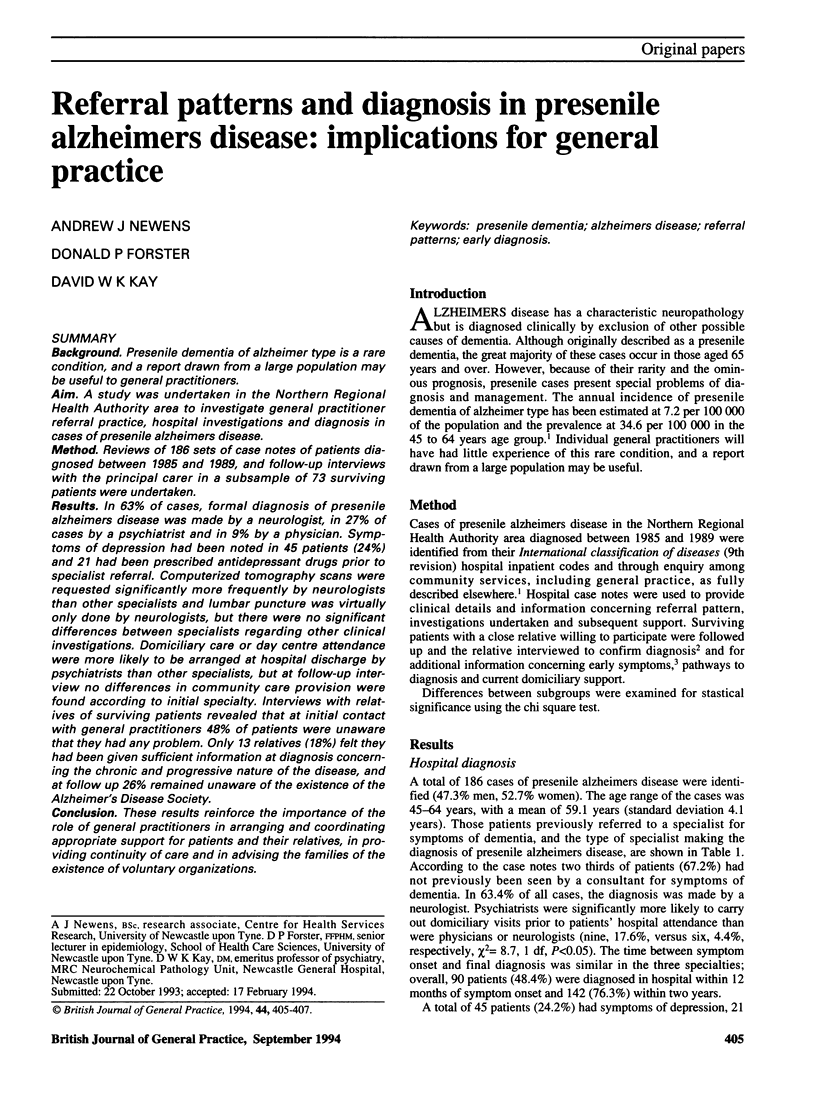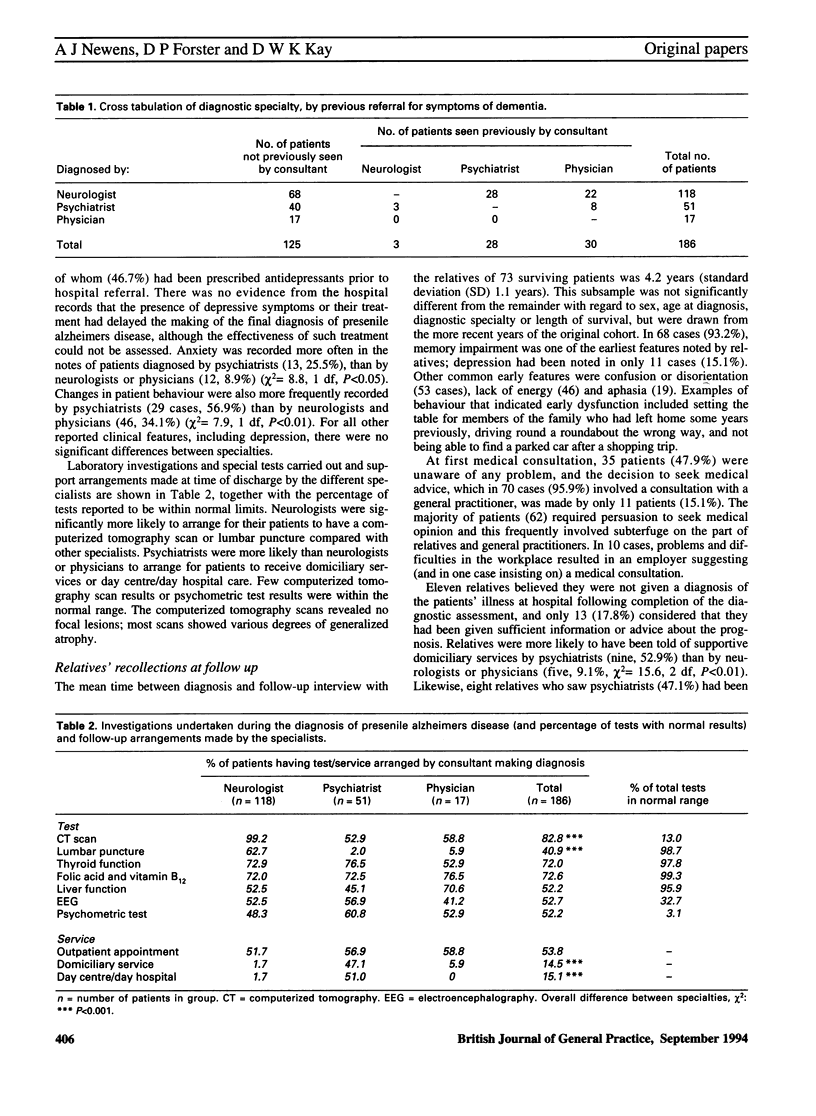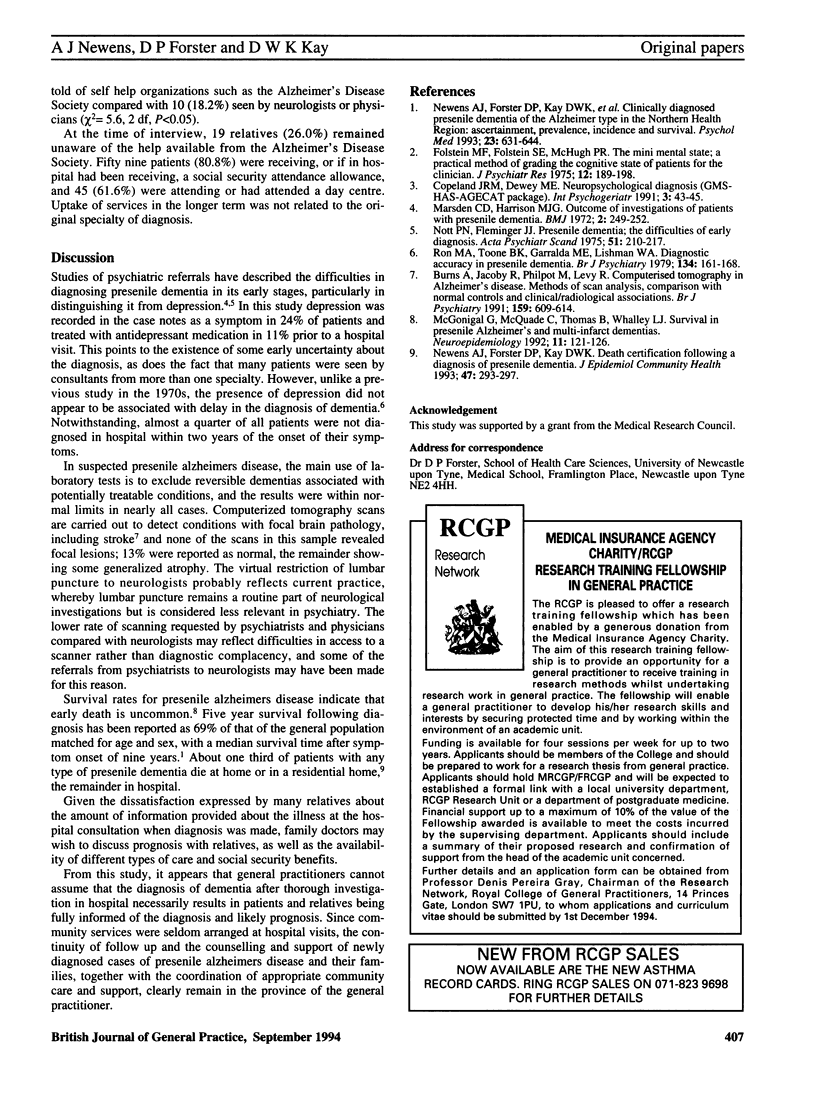Abstract
BACKGROUND: Presenile dementia of alzheimer type is a rare condition, and a report drawn from a large population may be useful to general practitioners. AIM: A study was undertaken in the Northern Regional Health Authority area to investigate general practitioner referral practice, hospital investigations and diagnosis in cases of presenile alzheimers disease. METHOD: Reviews of 186 sets of case notes of patients diagnosed between 1985 and 1989, and follow-up interviews with the principal carer in a subsample of 73 surviving patients were undertaken. RESULTS: In 63% of cases, formal diagnosis of presenile alzheimers disease was made by a neurologist, in 27% of cases by a psychiatrist and in 9% by a physician. Symptoms of depression had been noted in 45 patients (24%) and 21 had been prescribed antidepressant drugs prior to specialist referral. Computerized tomography scans were requested significantly more frequently by neurologists than other specialists and lumbar puncture was virtually only done by neurologists, but there were no significant differences between specialists regarding other clinical investigations. Domiciliary care or day centre attendance were more likely to be arranged at hospital discharge by psychiatrists than other specialists, but at follow-up interview no differences in community care provision were found according to initial specialty. Interviews with relatives of surviving patients revealed that at initial contact with general practitioners 48% of patients were unaware that they had any problem. Only 13 relatives (18%) felt they had been given sufficient information at diagnosis concerning the chronic and progressive nature of the disease, and at follow up 26% remained unaware of the existence of the Alzheimer's Disease Society. CONCLUSION: These results reinforce the importance of the role of general practitioners in arranging and coordinating appropriate support for patients and their relatives, in providing continuity of care and in advising the families of the existence of voluntary organizations.
Full text
PDF


Selected References
These references are in PubMed. This may not be the complete list of references from this article.
- Burns A., Jacoby R., Philpot M., Levy R. Computerised tomography in Alzheimer's disease. Methods of scan analysis, comparison with normal controls, and clinical/radiological associations. Br J Psychiatry. 1991 Nov;159:609–614. doi: 10.1192/bjp.159.5.609. [DOI] [PubMed] [Google Scholar]
- Folstein M. F., Folstein S. E., McHugh P. R. "Mini-mental state". A practical method for grading the cognitive state of patients for the clinician. J Psychiatr Res. 1975 Nov;12(3):189–198. doi: 10.1016/0022-3956(75)90026-6. [DOI] [PubMed] [Google Scholar]
- Marsden C. D., Harrison M. J. Outcome of investigation of patients with presenile dementia. Br Med J. 1972 Apr 29;2(5808):249–252. doi: 10.1136/bmj.2.5808.249. [DOI] [PMC free article] [PubMed] [Google Scholar]
- McGonigal G., McQuade C. A., Thomas B. M., Whalley L. J. Survival in presenile Alzheimer's and multi-infarct dementias. Neuroepidemiology. 1992;11(3):121–126. doi: 10.1159/000110921. [DOI] [PubMed] [Google Scholar]
- Newens A. J., Forster D. P., Kay D. W. Death certification after a diagnosis of presenile dementia. J Epidemiol Community Health. 1993 Aug;47(4):293–297. doi: 10.1136/jech.47.4.293. [DOI] [PMC free article] [PubMed] [Google Scholar]
- Newens A. J., Forster D. P., Kay D. W., Kirkup W., Bates D., Edwardson J. Clinically diagnosed presenile dementia of the Alzheimer type in the Northern Health Region: ascertainment, prevalence, incidence and survival. Psychol Med. 1993 Aug;23(3):631–644. doi: 10.1017/s0033291700025411. [DOI] [PubMed] [Google Scholar]
- Nott P. N., Fleminger J. J. Presenile dementia: the difficulties of early diagnosis. Acta Psychiatr Scand. 1975 Mar;51(3):210–217. doi: 10.1111/j.1600-0447.1975.tb00006.x. [DOI] [PubMed] [Google Scholar]
- Ron M. A., Toone B. K., Garralda M. E., Lishman W. A. Diagnostic accuracy in presenile dementia. Br J Psychiatry. 1979 Feb;134:161–168. doi: 10.1192/bjp.134.2.161. [DOI] [PubMed] [Google Scholar]


